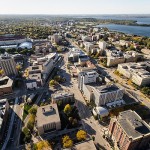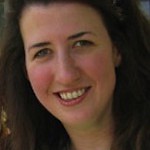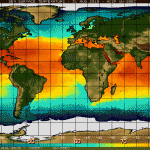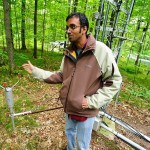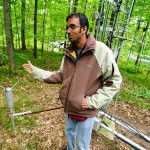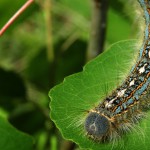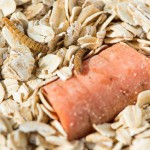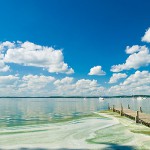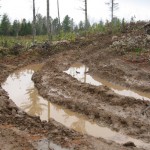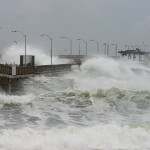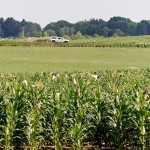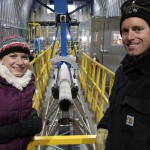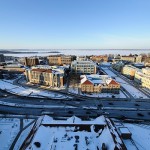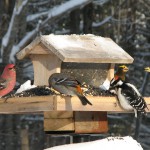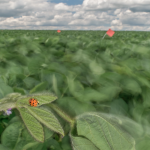Tag Climate change
Final MOOC of the year explores climate change policy and public health
“Climate Change Policy and Public Health,” the sixth and final Massive Open Online Course offered by the University of Wisconsin–Madison this year, launches Nov. 9.
Heat waves hit heat islands hardest
Extreme summers like that of 2012 - which saw record temperatures in cities across the U.S. - may be atypical, but experts say they will return, especially as the planet warms under climate change. And as they do, cities will be especially vulnerable.
Holloway named inaugural fellow of AAAS Leshner Leadership Institute
The American Association for the Advancement of Science (AAAS) has named Tracey Holloway, a professor of environmental studies at the University of Wisconsin–Madison, an inaugural Public Engagement Fellow of the Alan I. Leshner Leadership Institute for Public Engagement with Science for 2016-17.
Understanding El Niño: Q&A with Dan Vimont
What’s fierce, massive and likened to Godzilla? The 2015 El Niño — or at least in its vivid media descriptions.
Team tracks the uncertain climate footprint of wetlands
When is a wetland a sink and when is a wetland a source?
Hurricane expert Kerry Emanuel to speak at UW–Madison
Kerry Emanuel, a leading authority on hurricanes and climate, will deliver the 6th Len Robock Annual Lecture March 24 at the University of Wisconsin–Madison.
Munching bugs thwart eager trees, reducing the carbon sink
A new study published today [Monday, March 2, 2015] in Nature Plants shows that hungry, plant-eating insects may limit the ability of forests to take up elevated levels of carbon dioxide in the atmosphere, reducing their capacity to slow human-driven climate change.
Humanity has exceeded 4 of 9 ‘planetary boundaries,’ according to researchers
An international team of researchers says climate change, the loss of biosphere integrity, land-system change, and altered biogeochemical cycles like phosphorus and nitrogen runoff have all passed beyond levels that put humanity in a “safe operating space.” Civilization has crossed four of nine so-called planetary boundaries as the result of human activity, according to a report published today in Science by the 18-member research team. Among them is Steve Carpenter, director of the University of Wisconsin–Madison Center for Limnology and the only U.S.-based researcher on the study.
Muddy forests, shorter winters present challenges for loggers
Stable, frozen ground has long been recognized a logger’s friend, capable of supporting equipment and trucks in marshy or soggy forests. Now, a comprehensive look at weather from 1948 onward shows that the logger’s friend is melting. The study, published in the current issue of the Journal of Environmental Management, finds that the period of frozen ground has declined by an average of two or three weeks since 1948.
Study models the past to understand the future of strengthening El Niño
El Niño is not a contemporary phenomenon; it’s long been the Earth’s dominant source of year-to-year climate fluctuation. But as the climate warms and the feedbacks that drive the cycle change, researchers want to know how El Niño will respond. A team of researchers led by the University of Wisconsin’s Zhengyu Liu will publish the latest findings in this quest Nov. 27 in Nature.
Satellite history at UW–Madison comes full circle with award
Michael Pavolonis thinks of himself as a volcano guy.
Crops play a major role in the annual CO2 cycle increase
In a study published Wednesday, Nov. 19, in Nature, scientists at Boston University, the University of New Hampshire, the University of Michigan, the University of Minnesota, the University of Wisconsin–Madison and McGill University show that a steep rise in the productivity of crops grown for food accounts for as much as 25 percent of the increase in this carbon dioxide (CO2) seasonality.
They know the drill: UW leads the league in boring through ice sheets
Hollow coring drills designed and managed by UW–Madison’s Ice Drilling Design and Operations (IDDO) program are used to extract ice cores that can analyze the past atmosphere. Shaun Marcott, an assistant professor of geoscience at UW–Madison, was the first author of a paper published today in the journal Nature documenting carbon dioxide in the atmosphere between 23,000 and 9,000 years ago, based on data from an 11,000-foot hole in Antarctica.
When the isthmus is an island: Madison’s hottest, and coldest, spots
In a new study published this month in the Journal of Applied Meteorology and Climatology, University of Wisconsin–Madison researchers highlight the urban heat island effect in Madison: The city’s concentrated asphalt, brick and concrete lead to higher temperatures than its nonurban surroundings.
Climate change alters cast of winter birds
Over the past two decades, the resident communities of birds that attend eastern North America’s backyard bird feeders in winter have quietly been remade, most likely as a result of a warming climate. Writing this week in the journal Global Change Biology, University of Wisconsin–Madison wildlife biologists Benjamin Zuckerberg and Karine Princé document that once rare wintering bird species are now commonplace in the American Northeast.
Actions on climate change bring better health, study says
The number of extremely hot days in Eastern and Midwestern U.S. cities is projected to triple by mid-century, according to a new study led by University of Wisconsin–Madison researchers and published today in the Journal of the American Medical Association.
Dwindling wind may tip predator-prey balance
Bent and tossed by the wind, a field of soybean plants presents a challenge for an Asian lady beetle on the hunt for aphids. But what if the air - and the soybeans - were still?

